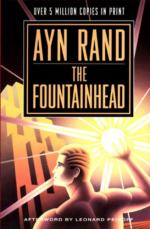|
|
The Fountainhead Part 3, Chapter 1
Alone in his apartment, Gail Wynand raises a gun to his temple, but feels nothing, not a sense of dread or terror, so he lowers the gun. His day today has been like usual; he went to the office, watched people work there, went late to a board of directors meeting. left the meeting mid-sentence, and did some work in his office. He is to build a development community on Long Island, called the Stoneridge Development, and has not chosen the architect yet. He calls Alvah and asks him about a book called The Gallant Gallstone, which has been mentioned many times all over his paper. Alvah reveals that it was Toohey who first mentioned it. Gail tells Alvah to have it stopped.
Toohey comes to see Wynand to sell Peter Keating as the architect for Stoneridge. He says that Mrs. Peter Keating can sell him better than Toohey can, and he would like Wynand to meet her. Wynand refuses, but Toohey says when he gets home there will be a gift there which will change his mind.
At home in his penthouse, Wynand is dining with a beautiful woman; unexpectedly, he ends their romance and gives her a diamond bracelet as commemoration. She leaves, and he sees the gun and decides that he will end his life tonight.
The story flashes to a twelve-year-old Wynand, living in Hell's Kitchen. He is the youngest member of a gang, and is waiting for the other gang members to attack him. Wynand disagreed with the gang leader that a looting should happen at daybreak instead of the middle of the night. He anticipates the other gang members' moves and jumps at them, winning the fight and becoming the gang leader. The looting is executed perfectly, at daybreak.
He works selling newspapers for a while on the street corner, until he is fired for making the suggestion that they should deliver the papers to the reader's door. He has several other jobs, and his bosses all end up telling him that he doesn't run things here. Having never gone to school, but always learning things from those around him, he goes to public school at the age of thirteen, and finds he already knows the answers. Eventually, he leaves because he knows everything they try to teach him. He realizes that the only real difference between the rich people on Fifth Avenue and the people who live in Hell's Kitchen is that the rich people read books. So, he sets about reading everything he can get his hands on.
One day he gets a beating from a longshoreman; he is conscious after the beating, and drags himself using only his arms to the door of a saloonkeeper and knocks on the door. The saloonkeeper opens the door, sees him, and goes back inside. Later, Gail Wynand remembers the saloonkeeper, bankrupts his business, and drives him to suicide.
When his father dies, Wynand decides what he will do with his life; he goes to a newspaper and asks for a job, but they say they don't have any openings. He tells them he'll hang around, and they can use him when they need him. Ten days later, he becomes a salaried employee. He becomes a reporter in six months and an associate editor in two years.
During his time as an editor, the police captain, Pat Mulligan, was framed for a crime. This outraged Wynand because Mulligan was the only honest man he knew. He clips an editorial tribute to integrity that he found written in a major newspaper and goes to see the writer. Wynand plans to fight the powers that ruined Mulligan, but finds that the writer doesn't believe a word of what he wrote in his own editorial. From then on, Wynand feels contempt for integrity, and thinks of himself and Mulligan as suckers. He writes an editorial blasting Mulligan. At 23, he gets a rival political gang to buy the Gazette and make him Editor in Chief. Later, he exposes them for crimes and sends them to jail. He changes the paper's name to The Banner and gives the public what they want in a newspaper: sensationalist stories with morals with which no one will argue. When there was no news to report, the Banner made news. Wynand got paid only his living expenses, but paid his workers extravagantly and spent incredible amounts of money on The Banner. He gives his life to the public, appearing in his newspaper more than celebrities do. The only part of his life kept private is his art gallery, on the floor below his penthouse apartment. No one is admitted except the caretaker.
After Gail turns forty-five, he begins to have a new passion: breaking those with integrity. He buys people who have high ideals and convictions, and brings them to work for him, to write columns about unimportant things.
Wynand decides that since he feels nothing at the thought of death but feels some fear at the thought of living, he will not kill himself, not tonight. He finds Toohey's gift, the statue of Dominique from the Stoddard Temple. He calls Toohey and asks the name of the sculptor, not the model. Toohey tells him that he forgets the name of the sculptor, but the model is the young Mrs. Keating. Gail agrees to see her, and tells Toohey he doesn't understand how he could part with a statue as beautiful as this.




